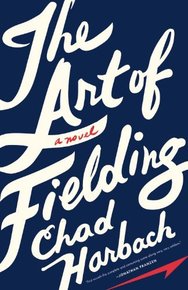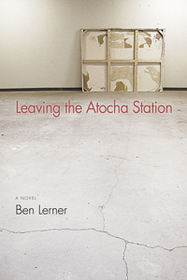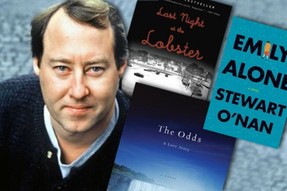|
Thanks to Iron Husband Matt Karp, the movies of 2011 occupied most of my blogging brain in recent months (see the fruits of those labors over at the Iron List). But I've been reading, too. Not as much as I would like, but enough to blab about it for a little while here.  First up, The Art of Fielding by Chad Harbach, which, a few debatable plot points aside, really is that good. I mean, I read that thing jealously in every sense of the word -- wishing people would leave me alone and just let me read, wishing I'd written it myself. Damn him. I guess I understand why it might be a hard sell for some readers: there's really only one female character, and there's a LOT of stuff about baseball. But Harbach succeeds where so many otherwise talented sports novelists fall short (I'm looking at you, Richard Ford); he really captures the experience of the athlete. Not just the punishing work-outs, the throbbing knees, and the pain of losing (though that's all beautifully, viscerally there), but also the rare single-mindedness of athletic pursuit -- the rather extraordinary (and also rather limited) way that the best athletes can deafen themselves to background noise, suppress interest in other human activities, and make an entire life of one motion, performed again and again and again. While transcendence is what everyone's after, Henry Skrimshander is remarkable for his narrowness, Mike Schwartz for his tolerance for pain. So, OK, yes, I'm sucker for jocks, but baseball is not my sport. In fact, my apathy borders on hatred: those long games, that long season, those stupid uniforms with those embarrassing belts. Why watch a misshapen guy stand around in the outfield when you can watch Dwyane Wade unleash himself for a steal and a rearing, hurtling fast break? But Harbach made me kind of like baseball, and that may well be a literary triumph in itself.  Leaving the Atocha Station was another literary darling of 2011, and another take on ambition. It's a slim novel by the young poet Ben Lerner about a self-loathing, over-medicated young poet on a prestigious fellowship in Spain. I assume it's autobiographical, because, among other coincidences, both the author and the narrator, whose name I can't remember, are from Topeka, and son to a famous feminist psychologist. (Having worked on Harriet Lerner's backlist in a past life, this particular coincidence pleased me to no end.) The book looks and feels like a monograph you're forced to read for a sociology course, but otherwise, Coffee House Press did very well by it. This is a delightful, chastening novel about personal and political anxiety and the perils of trying to speak Spanish when you can't. Highly recommended.  And then, of course, there's Stewart O'Nan, who gets ordinary American life better than almost anyone. It's incredible how much he notices. He takes care to refer to the "ass-end" of the dishwasher, which I can only assume is exactly what a Red Lobster line chef would call it (Last Night at the Lobster). He can build an entire chapter around the mysterious appearance of spray-painted numbers on a sidewalk, and the breathless manner in which an older woman harps on it to her grown children, though she knows that neither one cares (Emily, Alone). He can capture the exact cranky feeling of standing in line in the cold on vacation (The Odds). I read all three of these treasures in the past few months, and I can't stop being impressed with O'Nan. He's a writer who makes characters and story out of details so mundane, most other writers would just as soon skip them -- which turns out to be those other writers' loss.
4 Comments
|
Aboutauthor of The Violet Hour, reader, prodigious eater of ice cream Archives
June 2014
Categories
All
|
 RSS Feed
RSS Feed